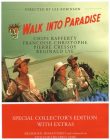| |
From Una Voce, June 2008, p. 6
That’s how PNGAA Patron Fred Kaad OBE described Harry West when asking the Annual General Meeting in Sydney in April to create Harry an Honorary Life Member. Fred went on to pay Harry the following tribute:
An honorary life member must be an ordinary member who has rendered outstanding and meritorious service to the PNGAA. That member’s appointment can only be determined by a formal resolution passed at an AGM. So, after very long consideration – of several seconds – I have decided that the member who best fulfils these conditions is someone who has served as our association secretary for 10 years and president for 16 years – Mr Harry West! Harry has given his time and his best efforts to the association – but apart from his “official” work, he is such a good friend to everyone, doing all he can for individuals – not only those on the committee. He is humble, helpful and he listens. He may not agree with you, but he considers what he has been told before he answers. And he has moved with the times and, to a degree restructured the PNGAA committee so that it works better and faster. I’m glad that Harry could find no one to replace him as President last year. This same committee, together with our members, has shown its gratitude by giving him a gift although, fortunately for all of us, he remains on the committee. A huge card has been signed by all committee members and many others here at the AGM in appreciation of his outstanding and meritorious service. Thank you Harry!
Now, whilst I have the floor, I would like to mention some of the things that Harry West achieved in his many years in Papua New Guinea, the things that are probably uppermost in his memory. The formal things first. In late 1945, Papua and New Guinea were separate and both under military rule, and it was decided in Canberra that it was time they returned to civil administration. This was to be formally effected by a treaty to be signed by Colonel J.K. Murray, representing the civil administration, and Lieut-General H.C.H. Robertson and Major-General Basil Morris, who commanded each area. Colonel Murray was waiting at the appointed time and place at Salamaua for the signing, but “Red Robbie”, as he was known, had transport and radio difficulties and couldn’t get there. So Lieutenant Harry West, as the senior ANGAU officer in the vicinity, signed this significant treaty on behalf of General Robertson. A good start for a young officer! Harry took his Army discharge in Lae in 1946, and was soon in the Highlands as one of three men who looked after the whole of what is now the Chimbu province, most of it then classified uncontrolled.
In 1958-59, Harry served as the first Australian Liaison Officer in Netherlands New Guinea, based in what was then Hollandia, but he ended by doing much travelling because at that time the Indonesians were still fighting the Dutch, and their paratroops were trying to get a foothold in the country, so Harry’s was a very strategic posting – not all gin and bitters, but rather hard work.
In 1967, Harry, then in Rabaul, was appointed for two months as Australian Special Representative to the 34th Meeting of the Trusteeship Council of the United Nations. Those of you who have experienced the UN Missions that came to PNG can appreciate that there were sometimes intelligent and probing questions, but more often uninformed, ridiculous and one-eyed questions with which Harry would have been confronted. During his time in New York the Six Day War initiated by Israel occurred, so Harry met many of the international leaders and dignitaries, including Khrushchev, who had gathered at the UN in response to the war, and he witnessed the celebrated occasion of Khrushchev banging his shoe on the table in the General Assembly.
Then it was back to PNG to continue his Rabaul posting, then to Moresby as First Assistant Secretary Native Affairs in the Department of the Administrator, before taking long leave in Australia and finally his discharge on medical grounds in 1973. But much more than these formal responsibilities will remain in Harry’s mind.
There was his time at Telofomin in 1950 when he led patrols to the May River and Oksapmim, then to Aitape and Kainantu. Here he took a very great risk, of which he and all those who knew the situation were justifiably proud. He moved the approved planned route down through the Kassam Pass to another route he believed was much better and this new route became the final way down towards Lae.
Possibly Harry’s greatest contribution was those six years in Rabaul during the Mataungan period where he had to try and fight for the commonsense of people on the ground against orders from Moresby and Canberra. I was in Rabaul for the first year of Harry’s period and can vouch for the growing unrest with which he had to try and cope, and the problems he had to face. But Harry West is both a gentle man, and a gentleman. Some of you may remember that he clashed with Prime Minister Gough Whitlam when Harry made what he saw as a brief, polite correction of fact of something Whitlam said publicly in Rabaul about the gun-shot wounding of a native child. But Whitlam saw it as arrogant, bureaucratic interference, and it all got an airing in Federal Parliament.
[The formal motion to make Harry an honorary life member was at this point put, and passed unanimously.]
|


